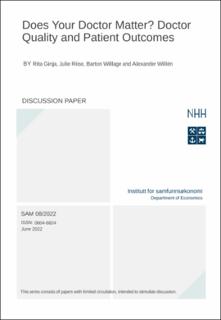Does Your Doctor Matter? Doctor Quality and Patient Outcomes
Working paper

Åpne
Permanent lenke
https://hdl.handle.net/11250/2997666Utgivelsesdato
2022-06Metadata
Vis full innførselSamlinger
- Discussion papers (SAM) [657]
Sammendrag
We estimate doctor value-added and provide evidence on the distribution of physician quality in an entire country, combining rich population-wide register data with random assignment of patients to general practitioners (GPs). We show that there is substantial variation in the quality of physicians, as measured by patients’ post-assignment mortality, in the primary care sector. Specifically, a one standard deviation increase in doctor quality is associated with a 12.2percentage point decline in a patient’s two-year mortality risk. While we find evidence of observable doctor characteristics and practice styles influencing a GP’s value-added, a standard decomposition exercise reveals that most of the quality variation is driven by unobserved differences across doctors. Finally, we show that patients are unable to identify who the high-quality doctors are, and that patient-generated GP ratings are uncorrelated with GP value-added. Using a lower bound of the predicted value of an additional life year in Norway (35 000 dollar), our results demonstrate that replacing the worst performing GPs (5 percent of the VA distribution) with GPs of average quality generates a social benefit of 27 417 dollar per patient, 9.05 million dollar per GP, or 934 million dollar in total. At the same time, our results show that higher-quality GPs are associated with a lower per-patient cost.